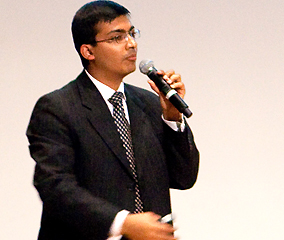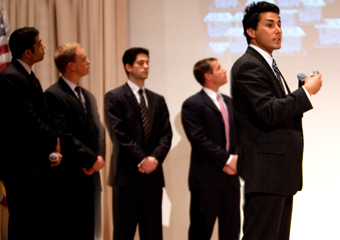Harvard Business School Holds 14th Annual Business Plan Contest
|
BOSTON, April 29, 2010 — Teams of student entrepreneurs aiming to ensure clean energy and clean water took first-place prizes on Tuesday (April 27) in the final round of Harvard Business School's 14th annual Business Plan Contest. The contest awards a total of $170,000 in cash and in-kind services to the winners and runners-up in the business venture and social venture tracks. Eighty-three teams in the business venture track and twenty-seven in the social venture track, which focuses on creating social value via nonprofit, for-profit, or hybrid model plans, submitted plans to the 2010 contest. Over time, more than 100 judges from fields such as venture capital, angel investing, consulting, law, accounting, life sciences, high technology, philanthropy, social entrepreneurship, and academia reduced the field to the total of eight finalists who competed before a large audience in Burden Auditorium. "The Business Plan Contest has become an important part of the HBS curriculum," said Dean Jay Light. "Participants in both tracks have left behind an amazing record of achievement." The winners in the business venture track were HBS second-year MBA student Shantanu Agarwal and MIT Sloan School students Pedro Tomas Santos and Emmanuel Magani, cofounders of OsComp Systems. They are commercializing a revolutionary gas compressor technology developed in conjunction with MIT that drives natural gas into pipelines at a lower cost and with greater efficiency. Associate Professor Noel Maurer served as their faculty advisor.  Shantanu Agarwal of Oscomp Systems
Photo Credit: Evgenia Eliseeva
Shantanu Agarwal of Oscomp Systems
Photo Credit: Evgenia Eliseeva
In the social venture track, which was marking its 10th anniversary as part of the contest, the top team was Urban Water Partners (UWP). Comprising Harvard first-year MBA students Porter Jones, MD, Ajay Kori, and Aaron Matto, as well as University of Utah medical students Jason Young and Justin Iwasaki, UWP will lease filters to water vendors in the Tanzanian city of Dar es Salaam to markedly improve access to clean drinking water for the city's population of some 3 million people. Assistant Professor Alnoor Ebrahim was their faculty advisor. Senior Lecture Michael Roberts, executive director of the School's Arthur Rock Center for Entrepreneurship, announced three runners-up in the business venture track. They were (in alphabetical order):
 Urban Water Partners team
Photo Credit: Evgenia Eliseeva
Urban Water Partners team
Photo Credit: Evgenia Eliseeva
Senior Lecturer Michael Chu announced the runner-up in the social enterprise track:
Following a tradition that began a decade ago, the OsComp Systems team received the Dubilier Prize, honoring the late Martin Dubilier (MBA 1952), cofounder of the prominent leveraged buyout firm of Clayton, Dubilier & Rice. The runners-up in the business venture track received the Satchu-Burgstone Entrepreneurship Award, which was endowed by Jon Burgstone (MBA 1999), Asif Satchu (MBA 1999), and Reza Satchu (MBA 1996) in 2001. After being named runners-up in the 1999 contest, these alumni went on to achieve considerable commercial success with their plan for SupplierMarket.com, an online marketplace for buying and selling manufactured materials. The winning and runner-up teams in the social venture track received the Peter M. Sacerdote Prize, established by Mr. Sacerdote (MBA 1964) in honor of his 40th reunion and the Campaign for the Harvard Business School to enable more HBS graduates to apply their skills to develop and launch social-purpose ventures. Mr. Sacerdote was in attendance to present the award. The winning team in each track also received $25,000 in cash as well as in-kind accounting and legal services, while $10,000 in cash and in-kind services went to each of the runner-up teams. Also recognized during the event was Krishna Mahesh (MBA 2005), founder and CEO of Sundaram Medical Devices and winner of Harvard Business School's first Alumni New Venture Contest. Sponsored by the Harvard Business School Club of India, Mahesh is creating a company that will build high-tech, high-quality, and low-cost medical beds for Indian healthcare facilities. Past participants in the HBS Business Plan Contest have gone on to create many successful companies such as Cloudfare, which enables Web sites to intelligently protect themselves from online attacks; Diagnostic-For-All, a nonprofit enterprise that has developed a low-cost, paper-based "lab-on-a-chip" for diagnosing diseases in poor regions around the globe; EyeView, which helps Web sites convert visitors into customers; Good Start Genetics, which is developing a low-cost, pre-pregnancy test for multiple genetic disorders; Finale, a Boston-area chain of four upscale restaurants specializing in fine desserts; and New Leaders for New Schools, a national nonprofit organization devoted to improving education for all children by attracting and preparing the next generation of outstanding leaders for urban public schools. Run under the auspices of the Harvard Business School's Arthur Rock Center for Entrepreneurship and the Social Enterprise Initiative, the HBS Business Plan Contest provides an integrative learning experience for all participants. The prime objectives of the contest are to educate students in the process of creating and evaluating new business ventures, prepare them for opportunities in traditional and social entrepreneurship during their careers, and harness the unique resources that HBS offers. The contest is one of several special programs funded by the Rock Center, which was created through the generosity of prominent venture capitalist Arthur Rock (MBA 1951). In 2003, he donated $25 million to HBS to support the entrepreneurship faculty and their research, fellowships for MBA and doctoral students, symposia and conferences, and new outreach efforts to extend the impact of the School's extensive work in this field. To further contribute to its research and course development efforts, Harvard Business School also established the California Research Center in the heart of Silicon Valley in 1997. Harvard Business School offered the country's first business school course in entrepreneurship in 1947. Today, members of the HBS Entrepreneurial Management Unit, which numbers more than 30 faculty, teach a required course to some 900 students in the first year of the MBA program along with a broad selection of popular elective courses to second-year students. The United States Association for Small Business and Entrepreneurship has recognized the Harvard Business School entrepreneurship program as the best in the country. |
About Harvard Business School
Harvard Business School, located on a 40-acre campus in Boston, was founded in 1908 as part of Harvard University. It is among the world's most trusted sources of management education and thought leadership. For more than a century, the School's faculty has combined a passion for teaching with rigorous research conducted alongside practitioners at world-leading organizations to educate leaders who make a difference in the world. Through a dynamic ecosystem of research, learning, and entrepreneurship that includes MBA, Doctoral, Executive Education, and Online programs, as well as numerous initiatives, centers, institutes, and labs, Harvard Business School fosters bold new ideas and collaborative learning networks that shape the future of business.
